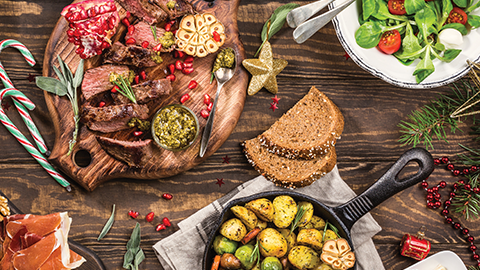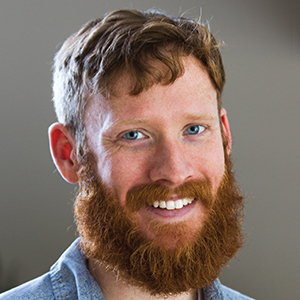Holidays may break our resolve, but not our microbiomes
If you’ve hit the potatoes, pies and thick turkey thighs a little too hard over the past six weeks, you’re not alone — least of all because trillions of bacteria in your gut were actively helping you pull as much energy as possible out of that pecan-crusted indulgence.

As you settle back into your nonholiday routine, though, you may wonder if your microbiome — arguably the hottest medical frontier of the past decade — has become a micro-PIE-ome, turning your recent cravings into habits and undermining your discipline for the foreseeable future.
The connection between what we eat and which bacteria wind up dominating our gut is well established, and people with high-fiber diets consistently have been found to have both a greater diversity of gut bacteria and a lower incidence of gastrointestinal inflammation than people consuming considerably less dietary fiber.
In a citizen project that sequenced the 16sRNA in stool samples from 248 volunteers, researchers from the Skolkovo Innovation Center in Russia and the University of Groningen in the Netherlands wrote in the journal Nutrients in 2018 that volunteers who self-reported switching to a diet that included more vegetables and fruit over the course of two weeks had increased levels of butyrate-producing Clostridiales bacteria and decreased levels of Bacteroides and related bacteria associated with diets rich in saturated fats and animal protein.
Additionally, several research groups independently have found gut microbes to be correlated with disorders including depression, anxiety and Parkinson’s disease, a connection made plausible by signaling molecules transmitted along the gut–brain axis. Researchers have found that mouse microbiomes can be disrupted by low-fiber diets in as little as a week and that gut bacteria can direct cravings in amino acid-deficient fruit flies.
Despite these correlations and studies, Purna C. Kashyap, a physician who runs the Gut Microbiome Laboratory at the Mayo Clinic, says a few weeks of eating nonhabitual foods are unlikely to alter the composition of your gut bacteria significantly.
“Short-term diet changes usually don’t cause a lasting change in the (human) microbiome,” he said. “If you look at the majority of the human studies — the dietary interventions even for four or six weeks — if they’re small dietary interventions, they don’t change the microbiome as much. And almost always, when you revert back to your diet, your microbiome comes back to its original state.”
Kashyap compared the gut microbiome to an elastic waistband that can be stretched regularly but still retain its shape.
“The microbiome is actually pretty resilient … but, if you stretch it beyond a certain extent, then you can’t get its shape back. But it takes a lot of effort to get to that point; it doesn’t happen overnight,” he said.
“The only caveat to this is that each individual has its own microbiome, which has its own resiliency, which means that the degree to which it would get disrupted and the speed with which it would come back may vary from individual to individual.”
That resiliency depends on the initial state of a person’s gut microbes — subjects who have lower microbial diversity and fewer of the fiber-digesting bacteria generally associated with lower levels of inflammation are more susceptible to overall bacterial turnover than subjects with more robust microbiota.
As far as cravings are concerned, the signaling methods bacteria might employ to drive us to seek food they prefer aren’t well defined biochemically, though they were proposed in a 2014 review in Wiley’s Bioessays that opined on the evolutionary role that gut bacteria might play in their host’s eating behavior.
Additionally, in 2017, researchers from Monash University in Australia and the Champalimaud Centre for the Unknown in Lisbon found that gut bacteria in Drosophila played a role in modulating food choice when flies were presented with diets deficient in selective amino acids. They described their work in the journal PLOS Biology.
“Ecologically and logically, if you think about this, it could make sense, because the bacteria drive a lot of the things we may be doing without realizing that they have to root for their survival,” Kashyap said. This can include increasing the levels of the hunger-related hormones glucagonlike peptide 1 and peptide YY.
“As you can imagine,” he said, “it’s a little bit more complex than Drosophila for us to be able to figure out what’s driving the food choices.”
Enjoy reading ASBMB Today?
Become a member to receive the print edition four times a year and the digital edition monthly.
Learn moreGet the latest from ASBMB Today
Enter your email address, and we’ll send you a weekly email with recent articles, interviews and more.
Latest in Science
Science highlights or most popular articles

Building a career in nutrition across continents
Driven by past women in science, Kazi Sarjana Safain left Bangladesh and pursued a scientific career in the U.S.

Avoiding common figure errors in manuscript submissions
The three figure issues most often flagged during JBC’s data integrity review are background signal errors, image reuse and undeclared splicing errors. Learn how to avoid these and prevent mistakes that could impede publication.

Ragweed compound thwarts aggressive bladder and breast cancers
Scientists from the University of Michigan reveal the mechanism of action of ambrosin, a compound from ragweed, selectively attacks advanced bladder and breast cancer cells in cell-based models, highlighting its potential to treat advanced tumors.

Lipid-lowering therapies could help treat IBD
Genetic evidence shows that drugs that reduce cholesterol or triglyceride levels can either raise or lower inflammatory bowel disease risk by altering gut microbes and immune signaling.

Key regulator of cholesterol protects against Alzheimer’s disease
A new study identifies oxysterol-binding protein-related protein 6 as a central controller of brain cholesterol balance, with protective effects against Alzheimer’s-related neurodegeneration.

From humble beginnings to unlocking lysosomal secrets
Monther Abu–Remaileh will receive the ASBMB’s 2026 Walter A. Shaw Young Investigator Award in Lipid Research at the ASBMB Annual Meeting, March 7-10 in Washington, D.C.

